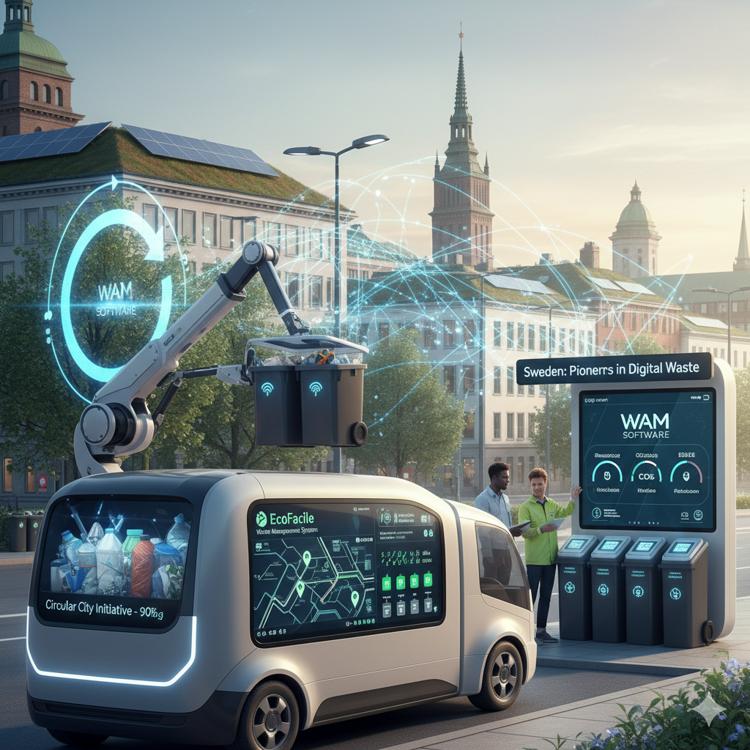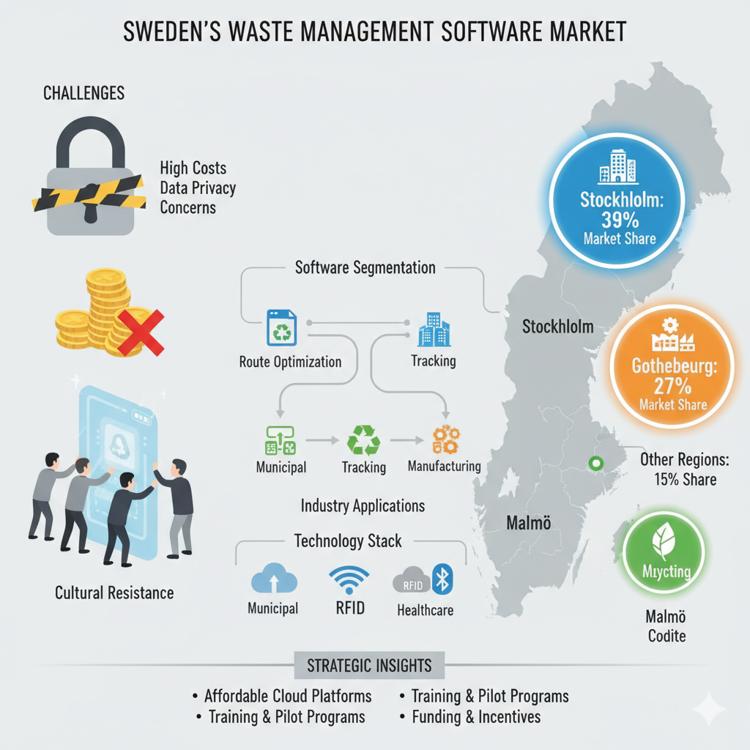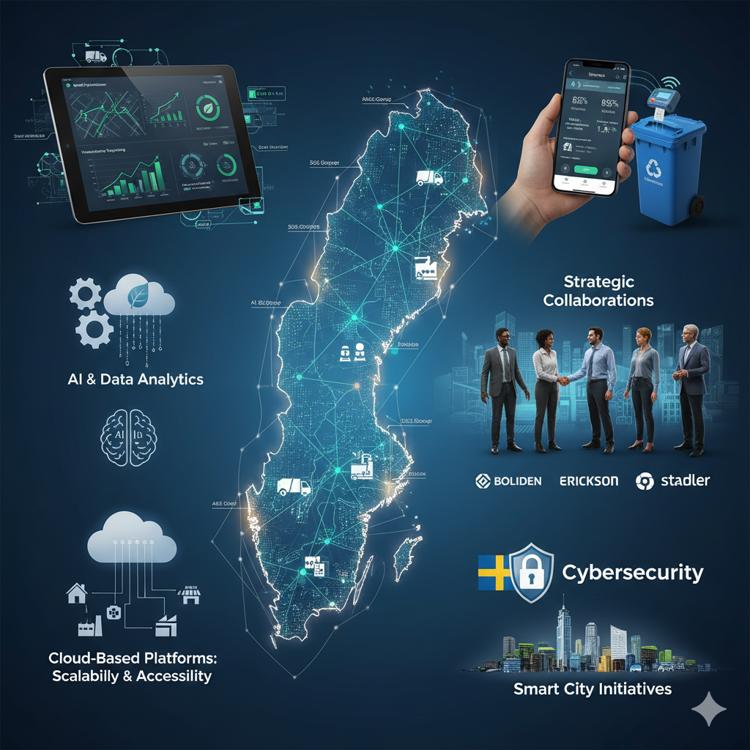Can Sweden Lead the Digital Waste Revolution? Exploring a $168 Million Software Market by 2032?

Sweden stands at the forefront of environmental sustainability, renowned for its advanced recycling systems and commitment to a circular economy. In line with these efforts, the country's waste management software market has experienced significant growth, projected to expand from USD 90.97 million in 2024 to USD 168.44 million by 2032, at a compound annual growth rate (CAGR) of 8.01% .. This article delves into the factors driving this growth, the technological advancements shaping the industry, and the key players contributing to Sweden's leadership in digital waste management.
Source: https://www.credenceresearch.com/report/sweden-waste-management-software-market
Market Dynamics and Growth Drivers
- Government Regulations and Compliance Needs
Sweden's stringent environmental regulations, aligned with European Union directives, mandate comprehensive waste management practices. Municipalities are required to implement digital solutions for waste tracking, recycling, and compliance reporting. These regulations drive the adoption of waste management software, ensuring transparency and accountability in waste handling.
- Adoption of Cloud-Based Platforms
Cloud-based waste management solutions offer scalability, cost-effectiveness, and real-time data access. Municipalities and enterprises in Sweden are increasingly adopting cloud platforms to enhance operational efficiency and integrate Internet of Things (IoT) technologies for smart waste management.
- Integration of IoT and Smart Technologies
The integration of IoT devices, such as RFID sensors and real-time locating systems (RTLS), enables real-time monitoring of waste bins and collection routes. This technological advancement allows for optimized waste collection schedules, reducing operational costs and environmental impact.
- Focus on Circular Economy Practices
Sweden's commitment to a circular economy emphasizes recycling, reuse, and resource optimization. Waste management software plays a crucial role in tracking recyclable materials, optimizing collection routes, and measuring sustainability metrics, aligning with the country's environmental goals.
Technological Innovations Shaping the Industry
- RFID and RTLS Technologies
Radio Frequency Identification (RFID) and RTLS technologies are pivotal in automating waste collection processes. These technologies provide accurate data on bin fill levels and collection times, facilitating efficient route planning and resource allocation.
- Data Analytics and Reporting Tools
Advanced data analytics and customizable reporting tools enable municipalities and enterprises to generate detailed sustainability and Environmental, Social, and Governance (ESG) reports. These tools assist in compliance with regulatory standards and enhance transparency in waste management practices.
- Mobile and Cloud-Based Platforms
Mobile applications and cloud-based platforms offer real-time updates and remote access to waste management systems. These platforms facilitate seamless communication between field personnel and management, improving coordination and response times.
Key Players in the Swedish Market
- AMCS Group
AMCS Group, headquartered in Ireland, has expanded its operations in Sweden, offering integrated software solutions for waste and recycling management. The company's recent equity deal with Swedish private equity firm EQT has further strengthened its presence in the Swedish market EcoFacile
EcoFacile provides cloud-based waste management solutions tailored to the needs of municipalities and enterprises in Sweden. Their platform integrates IoT technologies for real-time waste tracking and route optimization.
- Sequoia Waste Solutions
Sequoia Waste Solutions specializes in software solutions that support recycling, reuse, and resource optimization. Their platforms align with Sweden's circular economy practices, offering tools for tracking recyclable materials and measuring sustainability metrics.
- WAM Software
WAM Software offers waste management solutions that focus on compliance and operational efficiency. Their software modules assist municipalities and enterprises in meeting regulatory standards and optimizing waste collection processes.
Regional Insights
Stockholm leads the Swedish market with a 39% share, driven by advanced digital infrastructure and smart city initiatives. Other regions, including Gothenburg and Malmö, also show significant adoption of digital waste management solutions, supported by local government investments and sustainability goals
Challenges and Opportunities
Challenges:
- High Implementation Costs: The initial investment required for implementing waste management software can be a barrier for smaller municipalities and enterprises.
- Data Security Concerns: Ensuring the security of sensitive waste management data is crucial, particularly with the increasing adoption of cloud-based platforms.
- Integration with Legacy Systems: Integrating new software solutions with existing legacy systems can pose technical challenges and require additional resources.
Opportunities:
- Government Incentives: Government policies and incentives promoting digitalization and sustainability provide opportunities for vendors to expand their market reach.
- Technological Advancements: Ongoing advancements in IoT, data analytics, and cloud computing present opportunities for developing innovative waste management solutions.
- Public Awareness: Increasing public awareness of environmental issues drives demand for transparent and efficient waste management practices.
How Sweden is Leading the Digital Waste Management Revolution: Fact-Based Insights into a $168 Million Market by 2032
Sweden is widely recognized for its pioneering sustainability initiatives and commitment to a circular economy. Over the past decade, the country has made significant strides in modernizing waste management systems, with technology playing a pivotal role in driving efficiency, regulatory compliance, and environmental responsibility. The Swedish Waste Management Software Market, valued at USD 90.97 million in 2024 and projected to reach USD 168.44 million by 2032 at a CAGR of 8.01%, reflects this transformation. This article explores the key growth drivers, technological trends, and industry adoption patterns shaping Sweden’s digital waste landscape.
Key Growth Drivers
1. Strong Government Regulations and Circular Economy Initiatives
Sweden’s adherence to EU waste directives and national sustainability targets is a central driver of software adoption. Municipal authorities are increasingly investing in digital solutions to monitor recycling, reduce landfill usage, and control emissions. Waste management software plays a crucial role by tracking operational data, generating compliance reports, and optimizing collection processes in line with strict environmental standards.
The country’s shift toward a circular economy encourages municipalities and enterprises to adopt advanced software solutions that ensure operational efficiency and transparency. Compliance-driven platforms help minimize regulatory penalties, streamline reporting, and maintain accountability across sectors.
Case Example: Malmö Municipality expanded its collaboration with Sweden-based software provider Bintel, deploying a digital monitoring system equipped with smart sensors and AI analytics. This platform optimized waste collection routes, reduced emissions, and improved overall operational efficiency.
2. Rising Demand for Smart City Integration
Sweden’s urban areas are at the forefront of smart city initiatives, incorporating technology-driven solutions to enhance sustainability and operational efficiency. Smart city projects have significantly accelerated waste management software adoption, particularly through digital waste tracking, route optimization, and IoT-enabled monitoring systems.
Cloud-based platforms integrated with RFID and Wi-Fi technologies allow municipalities to automate collection schedules, monitor bin fill levels, and reduce operational costs. Public-private collaborations have further strengthened adoption, aligning software capabilities with municipal digitalization strategies.
Case Example: Denmark-based provider WasteHero, operating across Swedish municipalities, deployed IoT-enabled sensors and route optimization platforms in Malmö, reducing fuel consumption and improving collection efficiency.
3. Expanding Enterprise Adoption Across Industries
Beyond municipal applications, enterprises in retail, healthcare, and manufacturing are increasingly adopting waste management software. These industries require:
- Precise compliance documentation
- Cost optimization
- Sustainability reporting
Cloud-based solutions facilitate scalability and seamless integration with existing enterprise systems. For example:
- Retailers use digital tools to track and monitor waste streams.
- Healthcare facilities deploy compliance-driven solutions for hazardous waste management.
- Manufacturing companies prioritize route management and recycling modules to meet environmental regulations.
This cross-industry adoption diversifies market demand and establishes long-term growth opportunities for vendors offering versatile and compliance-ready platforms.
Key Trends and Opportunities
1. Shift Toward Cloud-Based and IoT-Enabled Platforms
The Swedish market is witnessing a significant shift toward cloud-based solutions due to their flexibility, scalability, and ability to integrate with IoT devices. Municipalities and enterprises leverage these platforms to optimize waste collection, monitor operations in real time, and improve reporting accuracy.
Vendors are investing in integrating RFID, Bluetooth, and Wi-Fi technologies, expanding the capabilities of their software and enabling intelligent platforms tailored for large-scale deployments. These platforms are particularly relevant for municipalities driving sustainability initiatives and industrial users seeking regulatory compliance.
Case Example: Envac Group upgraded its smart waste collection system in Stockholm, implementing cloud-based monitoring with RFID-enabled bins, improving route efficiency and reducing emissions.
2. Rising Focus on Data Analytics and Sustainability Reporting
Sweden is increasingly emphasizing data-driven sustainability. Advanced analytics are used to monitor waste streams, track compliance, and generate Environmental, Social, and Governance (ESG) reports. Platforms offering predictive insights, regulatory dashboards, and automated documentation are gaining popularity across sectors.
Vendors that integrate AI-driven analytics and reporting tools provide actionable insights, positioning themselves as strategic partners for municipalities and enterprises seeking to improve efficiency and transparency.
Case Example: Stena Recycling AB deployed AI-powered sorting and analytics platforms to enhance plastic and metal recovery rates, reducing landfill dependency and ensuring compliance with automated reporting dashboards.
3. Alignment with Sweden’s Circular Economy Goals
Waste management software in Sweden is increasingly designed to support circular economy objectives, including:
- Recycling optimization
- Resource recovery tracking
- Reduced environmental impact
By providing detailed analytics and compliance reports, these platforms empower municipalities and enterprises to meet national and EU sustainability targets, making them indispensable tools in Sweden’s environmentally conscious framework.
Challenges Facing the Market
While Sweden’s waste management software market is growing, several challenges persist:
- High Implementation Costs: Smaller municipalities and enterprises may struggle to invest in advanced software solutions.
- Data Security and Privacy: Cloud-based platforms must comply with strict GDPR regulations, ensuring secure handling of operational data.
- Integration with Legacy Systems: Existing infrastructure may require significant adaptation or replacement to accommodate modern software solutions.
Despite these challenges, the long-term benefits of efficiency gains, cost savings, and compliance adherence outweigh the initial investment, driving continued adoption.
Regional Insights
- Stockholm: Leads the market with advanced digital infrastructure, smart city projects, and strong municipal investments in sustainability.
- Gothenburg: Demonstrates significant adoption of cloud-based and IoT-enabled waste management systems.
- Malmö: Emerges as a testbed for innovative solutions such as AI-optimized waste collection and IoT-enabled monitoring.
- Other Regions: Collectively hold a growing share as municipalities and enterprises increasingly recognize the benefits of digital platforms.
Key Players in the Swedish Market
Major vendors shaping Sweden’s waste management software market include:
- EcoFacile: Cloud-based solutions with IoT integration for municipal and enterprise clients.
- AMCS Group: Offers integrated software for waste and recycling management.
- SEE Forge: Focuses on real-time waste tracking and route optimization.
- TRUX, WAM Software, Sequoia Waste Solutions, DesertMicro, SFS Chemical Safety, Delta Equipment Systems, Inc.: Provide compliance-driven, scalable platforms for municipal and industrial users.
These vendors compete through technological innovation, cloud adoption, and alignment with sustainability goals, driving market growth and reinforcing Sweden’s leadership in digital waste management.

1. 💸 High Implementation and Integration Costs: A Major Barrier to Adoption
While waste management software offers clear operational, environmental, and regulatory advantages, cost remains a major bottleneck.
- Upfront costs: Smaller municipalities and mid-sized enterprises often find it difficult to allocate budgets for digital transformation.
- Hidden expenses: Beyond software licenses, costs for staff training, system integration, and ongoing upgrades can significantly increase the total investment.
- Market implication: Unless vendors offer more affordable solutions—such as subscription-based cloud deployments—adoption could remain concentrated in larger cities.
Why it matters: This cost challenge risks leaving behind smaller municipalities and industries, creating a digital divide in Sweden’s waste management system.
2. 🔐 Data Privacy and Cybersecurity Concerns: The Trust Factor
As the adoption of cloud-based and IoT-enabled platforms accelerates, so do cybersecurity risks. Municipal and enterprise systems handle sensitive operational and compliance data, making them attractive targets for cyberattacks.
- Rising threats: Cyber breaches could expose waste collection routes, municipal compliance data, or enterprise waste streams.
- Regulatory compliance: Vendors must adhere to strict EU and Swedish data protection standards.
- Technology response: Encryption, secure APIs, advanced firewalls, and end-to-end security protocols are becoming non-negotiable features for credible platforms.
Why it matters: Without strong security measures, confidence in digital platforms could erode, slowing market expansion despite regulatory momentum.
3. 🧭 Resistance to Digital Transition: A Cultural Challenge
Even in a digitally mature country like Sweden, behavioral and cultural factors can impede technological adoption.
- Municipal hesitation: Some towns and local authorities prefer traditional systems due to limited technical expertise or fear of disruption.
- Enterprise reluctance: Smaller industries, particularly outside urban hubs, may view digital platforms as unnecessary complexity.
- Bridging the gap: Vendors need awareness campaigns, pilot programs, and strong customer support to ease the transition.
Why it matters: Technological advancement alone isn’t enough—building user confidence and demonstrating practical benefits is crucial to driving uptake across all regions.
4. 🏙 Stockholm: The Digital Waste Hub Leading with 39% Market Share
Stockholm stands at the forefront of Sweden’s waste management software revolution.
- Market share: 39% in 2024.
- Key strengths:
- Advanced digital infrastructure
- Smart city initiatives
- Strict environmental regulations
- Adoption trends:
- Municipalities leverage IoT-enabled route optimization and real-time waste tracking.
- Enterprises in healthcare and retail deploy cloud solutions for compliance and reporting.
Why it matters: Stockholm’s digital maturity and regulatory landscape make it a primary launchpad for vendors seeking scalable deployments.
5. ⚙ Gothenburg: Industrial Powerhouse Driving Demand with 27% Market Share
Gothenburg plays a crucial role in scaling waste management software through its strong industrial ecosystem.
- Market share: 27% in 2024.
- Adoption drivers:
- Manufacturing sector pushes demand for compliance-driven solutions.
- Municipal governments emphasize sustainable waste processing.
- Public-private partnerships support innovation in recycling and tracking software.
- Strategic role: Acts as a secondary hub complementing Stockholm’s smart city leadership.
Why it matters: Gothenburg’s industrial strength makes it a proving ground for software solutions aimed at manufacturing and logistics-heavy environments.
6. 🌿 Malmö: Smart Waste Initiatives Powering 19% Market Share
Malmö has emerged as an innovative player in Sweden’s circular economy efforts.
- Market share: 19% in 2024.
- Strategic focus:
- Climate-neutral ambitions drive adoption of RFID-enabled systems for real-time tracking.
- Healthcare and retail industries increasingly use software for waste documentation and compliance.
- Investment in cloud infrastructure supports broader adoption among mid-sized enterprises.
Why it matters: Malmö’s proactive stance on smart waste initiatives makes it a model for mid-sized cities looking to scale digital solutions sustainably.
7. 🏘 Other Regions: Emerging Markets with 15% Market Share
While Stockholm, Gothenburg, and Malmö dominate, other regions collectively hold 15% of the market.
- Key characteristics:
- Gradual adoption in smaller municipalities and rural areas.
- Growing subscription-based solutions due to budget constraints.
- Rising demand for EU-compliant digital solutions.
- Opportunities:
- Targeted low-cost platforms could unlock this underserved segment.
- Awareness and training initiatives can accelerate adoption.
Why it matters: This is a fragmented but fast-growing segment that represents significant untapped market potential.
8. 🧠 Software Segmentation: Solutions Powering the Ecosystem
Sweden’s waste management software market isn’t monolithic—it’s diverse and specialized.
By Software Type:
- Waste Hauling Software
- Waste Tracking Software
- Route Management Software
- Scale Software
- Recycling Software
- Maintenance Software
- Others
Why it matters: Vendors offering modular solutions can serve different stakeholders—from municipalities to manufacturers—more effectively.
9. 🏢 Industry Applications: Beyond Municipalities
While municipalities remain core users, enterprise adoption is accelerating in key sectors:
- Municipal: Route optimization, recycling documentation, and compliance reporting.
- Retail: Tracking waste streams, optimizing logistics, and sustainability reporting.
- Manufacturing: Regulatory compliance, recycling, and process efficiency.
- Healthcare: Safe disposal of hazardous waste and reporting compliance.
- Others: Includes logistics, construction, and education sectors adopting niche solutions.
Why it matters: Diversified demand across industries reduces market volatility and ensures long-term growth for vendors.
10. 📡 Technology Stack: Building the Smart Waste Infrastructure
Sweden’s software ecosystem is built on cutting-edge technologies, enabling efficient, scalable, and intelligent waste management:
- Cloud-Based Software (dominant): Enables flexibility, scalability, and real-time analytics.
- On-Premise Software: Still relevant for large enterprises needing full control over data.
By Technology:
- Bluetooth
- Real-Time Locating System (RTLS)
- Radio Frequency Identification (RFID)
- Wi-Fi
- Others
Why it matters: A robust technology foundation is key to Sweden’s ambition to lead the European digital waste revolution.
🧭 Strategic Insights for Stakeholders
- Vendors should prioritize cost-effective, secure, and scalable cloud platforms to address cost and security barriers.
- Municipalities need training and pilot programs to reduce resistance to digital adoption.
- Investors should focus on Gothenburg’s industrial market and rural region expansion, where adoption potential is rising.
- Policy makers must support funding and incentives for smaller municipalities to bridge the digital divide.

1. 💻 How Are Key Players Defining Sweden’s Waste Management Software Landscape?
The competitive landscape of Sweden’s waste management software market is both diverse and technologically advanced. A blend of domestic and global vendors is shaping the future of the sector through innovation, collaboration, and smart technology integration.
Notable players include:
- EcoFacile
- AMCS Group
- SEE Forge
- TRUX
- WAM Software, Inc.
- Sequoia Waste Solutions
- DesertMicro
- SFS Chemical Safety
- Delta Equipment Systems, Inc.
These companies are competing not just on price—but on product innovation, cloud-based deployments, IoT integration, and end-to-end digitalization.
They focus on:
- Route optimization and tracking to improve municipal waste collection efficiency.
- Hazardous waste management modules to ensure regulatory compliance.
- Sustainability reporting tools that align with Sweden’s climate-neutral vision.
📊 Why this matters: In an environment where compliance, transparency, and operational efficiency are paramount, the ability to deliver customized, regulation-aligned software solutions gives vendors a competitive edge.
2. 🧠 How Is Technology Innovation Fueling Market Competition?
Sweden’s waste management software ecosystem is a technology battleground.
Vendors are racing to build platforms that not only comply with regulations but also integrate advanced features such as:
- RFID tracking for automated and precise waste documentation.
- IoT-enabled sensors for real-time monitoring and route planning.
- AI and data analytics to provide predictive insights and optimize operations.
- Cloud-based systems to enhance scalability, accessibility, and cost efficiency.
- Mobile access to make platforms more user-friendly for municipal workers and enterprise teams.
This high-tech competition doesn’t just increase market efficiency—it lowers environmental impact through optimized routing, lower emissions, and better recycling traceability.
📈 Future trend: As municipalities and enterprises demand real-time, actionable data, AI and cloud platforms will become central to vendor strategies.
3. 🏢 How Are Strategic Collaborations Shaping the Competitive Edge?
In Sweden, collaboration is as crucial as competition. Vendors strengthen their market positions through partnerships with municipalities, public authorities, and enterprises.
Recent examples highlight this trend:
- April 2025: Boliden, IVL, and Ericsson launched the Connected Recycling SaaS platform to track e-waste flows, improving traceability of copper and precious metals.
- July 2025: Stadler Anlagenbau GmbH and Stockholm Vatten och Avfall introduced a fully automated sorting plant processing up to 50 tons per hour—reducing incineration and emissions.
- August 2024: EQT Private Equity acquired a majority stake in AMCS Group to expand cloud-based, AI-powered waste management solutions.
- June 2025: EQT AB entered negotiations to acquire Waga Energy, advancing landfill gas-to-RNG technologies.
🤝 Why this matters: These collaborations demonstrate how public-private partnerships can drive large-scale infrastructure upgrades and boost adoption of digital platforms nationwide.
4. 🌍 Can Cloud-Based Platforms Power Scalable Waste Management?
Sweden’s smart city ambitions and regulatory environment make cloud technology a natural fit for the waste management software market.
- Municipal benefits: Lower infrastructure costs, easier scaling, and centralized monitoring.
- Enterprise benefits: Seamless integration with internal systems, data analytics, and compliance dashboards.
- Vendor strategies: Many leading providers now offer subscription-based cloud models to attract mid-sized municipalities and businesses with budget constraints.
☁️ Why this matters: Cloud platforms can make advanced waste management technology accessible to smaller towns, supporting nationwide adoption.
5. 🏷 Why Is RFID at the Heart of Automation?
Radio Frequency Identification (RFID) has become a cornerstone of digital waste operations in Sweden.
Key advantages include:
- Automated waste collection tracking
- Real-time recycling documentation
- Higher accuracy in compliance reporting
- Reduced manual data entry
Stockholm and Gothenburg have already integrated RFID-enabled bins and collection systems, setting a model for other cities.
📡 Why this matters: RFID doesn’t just streamline operations—it provides the data backbone that enables AI, analytics, and predictive modeling to function effectively.
6. 📊 How Are AI and Data Analytics Transforming the Market?
Sweden’s waste management ecosystem is rapidly shifting toward data-driven decision-making.
AI-powered platforms allow:
- Predictive forecasting of waste generation.
- Dynamic route adjustments to cut fuel consumption.
- Automated compliance dashboards for regulatory reporting.
- Real-time alerts on irregularities or operational bottlenecks.
For example, Stena Recycling has adopted AI-based systems to boost material recovery rates and ensure more efficient recycling workflows.
🧠 Why this matters: In a country with ambitious sustainability targets, data insights are key to meeting EU directives, optimizing costs, and minimizing environmental footprints.
7. 🏙 How Do Smart City Projects Drive Market Growth?
Sweden’s push toward smart and sustainable cities is one of the strongest forces behind software adoption.
- Urban municipalities integrate IoT solutions into city-wide digital platforms.
- Smart routing systems reduce traffic congestion and carbon emissions.
- Citizen engagement platforms help track, sort, and recycle more effectively.
Cities like Stockholm and Malmö are leading the way, proving that digital waste management can be a cornerstone of urban climate strategies.
🏗 Why this matters: Smart city initiatives create real-world use cases that encourage further investment and adoption across other regions.
8. 🏥 Which Industries Beyond Municipalities Are Driving Demand?
While municipalities dominate the market, other sectors are rapidly adopting digital waste solutions:
- Healthcare: Needs compliance-driven platforms for hazardous waste management.
- Retail: Uses tracking and reporting tools to meet sustainability targets.
- Manufacturing: Deploys route and recycling management to optimize operations.
- Construction and logistics: Leverage data to reduce waste and improve compliance.
🏭 Why this matters: Diversified demand ensures market stability, spreading growth beyond city governments to private enterprises.
9. 🛡 How Will Cybersecurity Shape Vendor Competition?
As more municipalities and industries go digital, data privacy and cybersecurity will become central to competition.
- Vendors must embed robust security protocols, including encryption, two-factor authentication, and compliance with GDPR standards.
- Public sector clients will prioritize security-certified platforms to protect sensitive operational data.
- Trust and transparency will become key differentiators among competing vendors.
🔐 Why this matters: In a digital-first ecosystem, cybersecurity isn’t optional—it’s a core selling point.
10. 🔮 What Does the Future of the Market Look Like?
Looking ahead, the Sweden Waste Management Software Market is expected to evolve rapidly through:
- 🏛 Municipal leadership in digital compliance and tracking.
- ☁️ Cloud-first strategies for cost-effective scalability.
- 📡 Continued focus on RFID automation and real-time tracking.
- 🧠 Wider adoption of AI-powered analytics for sustainability reporting.
- 🏙 Acceleration through smart city infrastructure.
- 🏢 Expansion into healthcare, retail, and manufacturing sectors.
- 💰 Subscription-based pricing models attracting SMEs.
- 🧰 Cybersecurity becoming a strategic priority.
- 🤝 Stronger public-private partnerships driving infrastructure upgrades.
- 🌍 Broader regional adoption supported by EU-aligned policies.
📈 Market outlook: Sweden’s competitive environment is not a challenge to overcome—but a strategic asset that can drive innovation, lower costs, and accelerate the nationwide digital waste revolution.

Conclusion: In summary, the Sweden Waste Management Software Market is poised for robust expansion, rising from USD 90.97 million in 2024 to an estimated USD 168.44 million by 2032 at a CAGR of 8.01%. Driven by strong regulatory pressures, circular economy goals, and growing municipal and enterprise digitization, the sector is increasingly dominated by cloud-based and IoT-integrated platforms. Key cities like Stockholm (holding 39% share), Gothenburg, and Malmö lead adoption thanks to advanced infrastructure and smart city initiatives. . Vendors are competing through deep customization—route management, hazardous waste handling, compliance reporting—and forming strategic partnerships with municipalities and industrial clients to stay relevant Looking ahead, broader cloud deployment, deeper analytics and AI integration, increased cybersecurity, and expanded regional reach beyond major cities will likely define winners in this evolving market
Source: https://www.credenceresearch.com/report/sweden-waste-management-software-market
- Business
- Research
- Energy
- Art
- Causes
- Tech
- Crafts
- crypto
- Dance
- Drinks
- Film
- Fitness
- Food
- Spellen
- Gardening
- Health
- Home
- Literature
- Music
- Networking
- Other
- Party
- Religion
- Shopping
- Sports
- Theater
- Wellness


